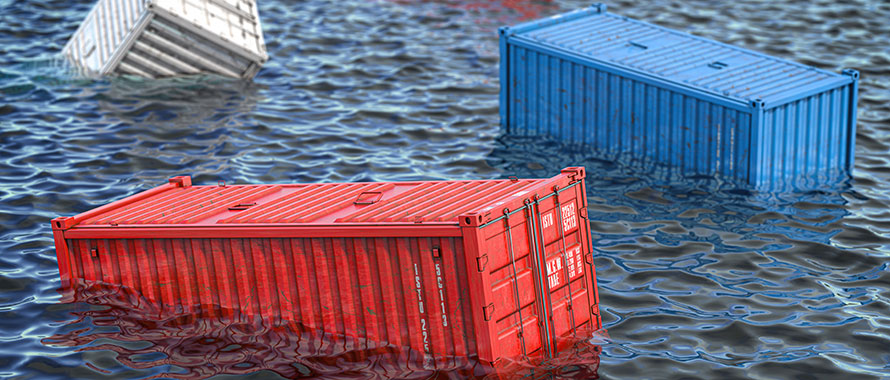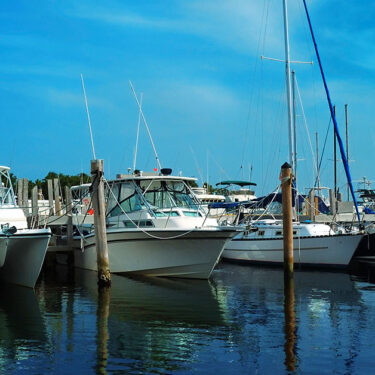Dozens of new YETI coolers have turned up on beaches in Alaska and beyond, more than a year after a cargo ship incident sent 1,600 of the products overboard. According to reports, the Zim Kingston ship lost 109 containers during a storm in October 2021 near the Port of Vancouver. Some of the high-end coolers, which sell for hundreds of dollars each, were initially spotted on Canadian shores and then on beaches in Alaska and even Hawaii.
Featured Solutions
If an insurance company already paid for the loss, they may be entitled to any salvage, said Patrick Barco, Manager, Ocean Marine, Burns & Wilcox, Toronto, Ontario. However, “I doubt they would want to get involved,” he said, noting that the remaining value of the coolers is unclear. “The expenses involved in retrieving them would likely be far greater.”
The story reinforces the importance of Ocean Cargo Insurance, said John Gambino, Cargo Manager, RB Jones Marine, New York, New York.
“Some companies take the chance, thinking that the loss is not going to happen to them, only to get caught by surprise,” he said. “Ocean Cargo Insurance can be tailored to cover the risks a company wants to insure. They can have total loss coverage, or they can insure for limited perils, as well as all risks. Either way, they have peace of mind that their balance sheet is protected.”
Overboard cargo causes significant losses, ship owners unlikely to fully reimburse
According to a 2020-2021 report from the World Shipping Council, the rate of international shipping containers being lost overboard each year has increased, reversing what had been a downward trend. The rate jumped by 18% between 2020 to 2021 to an average total of 1,629 containers lost per year. This may have been due in part to an unusually high number of severe weather incidents during the winter of 2020-21, the council noted.
“It is pretty common nowadays that containers are washed overboard, and this generally happens when the weather is extremely rough and it is beyond the shipping line’s control,” Barco said.
In April of 2021, Bloomberg reported that shipping containers were falling overboard at the fastest rate in seven years. “Whether or not the industry has turned a corner, I do not know,” Gambino said. “We do not read about as many containers going overboard as often as we did three years ago, but it could be just dumb luck.”

It is pretty common nowadays that containers are washed overboard, and this generally happens when the weather is extremely rough and it is beyond the shipping line’s control.
While overboard losses still accounted for less than 0.001% of shipments in 2021, even a single spill can lead to millions of dollars in losses. When the ONE Apus containership lost more than 1,800 containers during a storm in November of 2020, the total loss was expected to reach $200 million or more, according to Maritime Executive.
“A small loss may not really harm a company, but if they have five or 10 containers on board that vessel and they decided to take the risk themselves without insurance, then they are likely in big trouble,” Barco explained. “It could be a significant loss. They may think they can rely on the steamship line to reimburse them, but it is not that easy.”
This is because the ship owners generally limit their liability based on maritime law and may only pay for a fraction of the container’s value. “Companies may think they will be reimbursed for the full amount of their lost cargo, but that is not the case,” Barco said.

A small loss may not really harm a company, but if they have five or 10 containers on board that vessel and they decided to take the risk themselves without insurance, then they are likely in big trouble.
Ocean Cargo Insurance can cover the loss or damage of cargo due to severe weather, fire, water intrusion, theft and other causes. Most policies cover the value of the cargo plus freight, insurance and an additional 10% of the valuation, though other mark-ups can be negotiated, Gambino said.
“Some companies just want to insure for the cost of the merchandise, and other policies call for a selling-price valuation. That is something that a policyholder and their broker can negotiate,” he said. “The policyholder needs to make his own economic decision. The higher the insured value, the higher the premium.”
Understanding cleanup costs, liability after cargo spills
When a cargo spill occurs, recouping the value of the lost goods is not the only consideration for companies. They could also be held responsible for cleanup costs, as well as any environmental damage, injuries or other impacts of the spill. In June of 2021, a cargo ship carrying 25 tons of nitric acid caught fire and sank off the coast of Sri Lanka, raising concerns over years of potential ecological damage to the island, Newsweek reported. Plastic pollution is another major concern, with some experts calling containers lost at sea the “oil spills of our time” due to chemicals from plastics turning up on beaches, The Guardian reported in February of 2022.
Cleanup costs “could be admissible under the debris removal clause” of an Ocean Cargo Insurance policy, Barco said. However, this coverage is usually limited. “It could cost $25,000 in cleanup expenses, for example, but the policy could have a restriction, which is generally 10% of the insured value,” he said. In some cases, policies could cover cleanup expenses up to the policy limit.
Some companies could need a separate Cargo Legal Liability Insurance policy to cover possible third-party injuries or property damage caused by spilled cargo, Gambino said. If the spilled cargo caused a boating accident, for example, “it is hard to say what would happen on that type of claim,” so it is important for business owners to discuss the options with their insurance broker, he said.
“Not all of these containers will come ashore,” Gambino pointed out. “The others are bobbing around in the ocean and could become a hazard to navigation. A smaller fishing boat could suffer serious damage from a collision with a container leading to vessel damage and loss of life. If an accident occurs, you can certainly have a question of who is responsible at that point in time.”
A containership’s owner will generally carry liability coverage, as well, which could respond if fallen containers cause damage to another ship, for example. “At the end of the day, it is the ship owner who has the duty to deliver the goods safely to the final destination,” Barco said.
Anyone shipping products that could be hazardous to the environment should take extra precautions, Gambino added. “A YETI cooler may be considered rather nonhazardous but plenty of containers ship hazardous material,” he said. “If these things get into the water, you can have an impact on the water or wildlife. Container safety is important, and what is in them is important. Most companies need liability coverage.”
Aging fleets, theft among concerns for global shipping industry
Shipping companies have increased ship sizes over the years as global trade has grown, the New York Times reported in 2021, but these vessels can present additional challenges when problems occur. The Ever Given containership that blocked the Suez Canal in 2021 was in the top 1% globally for vessel size, CNN reported at the time, underscoring some of the concerns with larger ships.
“The bigger the ship, the more containers get on board, and the greater stress that the ocean, wind, waves and storms put on a vessel,” Gambino said. “That creates incredible stress on the lashings that hold the containers together. As ships get bigger, we are going to lose more containers overboard.”
Greater size also means the potential for more serious losses, according to Barco. “If one of them does sink, it could be a huge, huge loss to insure,” he said. At the same time, an aging fleet has problems of its own. Though the vessels may be smaller, “they are more prone to the engines not working or a lack of maintenance, which could lead to breakdowns and other issues during the voyage,” Barco said.

The bigger the ship, the more containers get on board, and the greater stress that the ocean, wind, waves and storms put on a vessel. … As ships get bigger, we are going to lose more containers overboard.
While severe weather will always play a role in the risk of cargo mishaps, shipping companies are responding to increasing cargo losses by better enforcing stacking standards to avoid top-heavy loads, cracking down on cargo that is improperly declared for weight or contents, and taking additional steps to prevent fires. “They have tightened security,” Barco said. “The industry is now taking action and being stricter in checking these containers. They are being more proactive.”
Theft is another ongoing threat in the industry, with delays during the pandemic forcing many containers to remain in ports for longer than usual. This has eased somewhat, Gambino said.
“What was terrible during the supply chain disruption was that cargo was staying in ports for 30, 60, 90 or 100 days because there were no truckers or there was no capacity on the rails because there was so much product bottlenecked in California,” he said. “When a container is moving, it is hard to open the doors and steal it. We are seeing less of it as we go into a recession, but the target items that were previously COVID masks and electronics have switched over to food and necessities. If you have a target commodity, make sure you are using the right shipping company, and getting it to move from point A to point B in as short a time as possible.”





